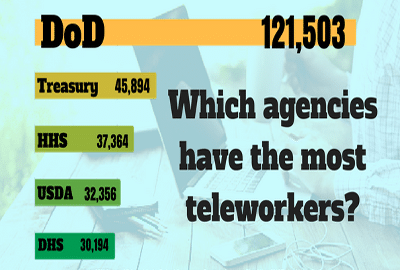
Teleworking: Here to stay or going away? You tell us
Federal News Radio's web team joins Senior Correspondent Mike Causey to answer common questions about teleworking.
Is it true, as many believe, that when it comes to working away from the office, younger workers embrace it while older employees view teleworking with suspicion?
Also, where is the dividing line between younger and older. Is it 40 years old, 50 years old, or what?
A lot of questions about teleworking but few good — as in provable — answers persist. Which is where, maybe, you and the gang at the office come in, we hope.
Federal News Radio is finding out what workers think about teleworking. Does it increase productivity, cut down on pollution and traffic jams as advertised, and is there a downside to teleworking? Does it hurt communication and collaboration? And what about the bottom line: What impact does it have on the customers?
A number of progressive, private, high-tech companies are reportedly having second thoughts about teleworking. Others such as Google want to make the office so attractive that people will want to come to work. Some — including the Agriculture Department — are cutting back on the number of employees who telework or the number of days they can work from home.
Over the past few weeks we have gotten a lot of comments from readers about teleworking:
- “My telework capability was cut back to a useless amount by Sonny Perdue at USDA. Is it possible that cutting back on telework is an effort to get people to leave the government under Trump’s agenda? Many of us need the work-life balance that telework provides. I have a 200 mile per day commute when I have to drive into the office.”
- “Mike Causey has mentioned, on a number of occasions, that older people (like himself, groan) are more likely to hold a negative view of telework. Why is that? Is it due to lack of technical proficiency or is there some other explanation?”
- “Why is there so much negative press on telework lately? It’s highly effective in my agency, particular to my division. My boss is at HQ in D.C. and I work in a completely different state. Doesn’t matter if I’m in the office or not as I never see my boss. However, I am in the office two days a week. I find I’m more productive teleworking as there are less distractions and employee interruptions. There’s talk of the younger generation not feeling part of a team? They are already so in-tuned with their faces stuck in their cell phones, I don’t see telework as causing that issue. They already lack the skills of face to face interaction. I feel like telework is being blamed when it shouldn’t. I do agree, telework is not for everyone. Those that tend to procrastinate and/or are not motivated won’t do well teleworking.”
- ”Most individuals in our Social Security office who don’t telework will be retiring within three years. That begs an important question: Who in the world will be calling numbers? The teleworkers can easily take a claim, but can the case be processed without printing the application and not having proof. The cases just pile up and that’s why teleworkers work many hours of overtime.”
- “The agencies and unions want to push telework to have more of a life-work balance. The whole system is not fair for the individuals who do not wish to telework. The employees that stay at work have to work harder to offset the teleworkers. We should only be able to telework once every two weeks. That would be a fairer system.”
So what is your take on teleworking — good, bad, what? It will be the subject of our Your Turn radio show today, featuring Federal News Radio digital editors and writers David Thornton and Terry Wing.
Send questions or comments by calling 202-465-3088, or emailing them to mcausey@federalnewsradio.com before showtime. Your Turn airs at 10 a.m. EDT at www.federalnewsradio.com or on 1500 AM in the D.C. metro area.
Also on today’s show, new Thrift Savings Plan investors are missing out as about 20,000 military personnel have opted in to TSP’s blended retirement plan. They get an automatic 1 percent government contribution but, because they are not contributing any money of their own, they are missing out on getting an additional government match of up to 4 percent. Federal News Radio Reporter Nicole Ogrysko joins me to talk about it.
Nearly Useless Factoid
By Amelia Brust
The human brain’s memory capacity is uncertain but scientific estimates range between 1 terabyte and 2.5 petabytes (2,500 terabytes) of storage.
Source: Slate.com and Scientific American
Copyright © 2025 Federal News Network. All rights reserved. This website is not intended for users located within the European Economic Area.
Mike Causey is senior correspondent for Federal News Network and writes his daily Federal Report column on federal employees’ pay, benefits and retirement.
Follow @mcauseyWFED






